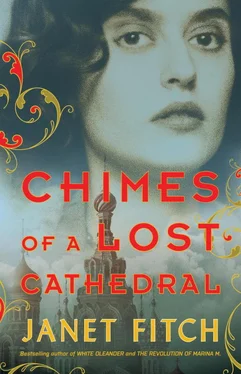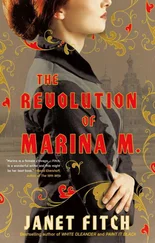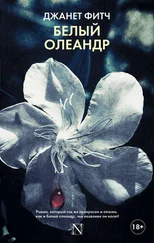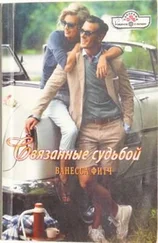We passed through great cities and little nowhere villages with their primitive stations and level crossings, women selling bread and milk as we moved up behind the lines. Now we were getting close to the battle, and saw the burned-out hamlets. Sometimes we could hear guns. We took on more and more soldiers heading back to their units. The summer raced on, the last few weeks of my pregnancy. Surely I could not get any bigger. All my bravery was gone. I was weary, feverish, irritable. No longer did I help out in the kino car, let alone yearn to ride on the roof of the carriage with the soldiers. It was as much as I could bear to simply lie in our compartment, sweating, lulled by the ta-tick-a-TICK, ta-tick-a-TICK, and the swaying of the car, listening to the actors in the next compartment arguing and playing cards. I nodded off, dreaming that the car was burning, everyone locked inside.
Genya came in from one of his meetings and sat down with me on my narrow bunk, wrung out a cloth in warmish water and put it on my head. He lay down beside me, squeezing me to the wall. He was too hot, and I was too big, we both were. “The 25th Rifle Division is closing in. Kolchak’s on the run,” he said, tucking a strand of my sweaty hair behind my ear. “They’re saying Trotsky’s going to start transferring troops toward Denikin if they succeed. Look, we’ve got a new poster!” He picked something off the floor, sat up, thank God, unrolled a sheet of paper. A single Red Army soldier in a giant red circle on the left, White officers hiding behind the Urals as if behind a theater curtain on the right. It was good, but I was too listless to join in his excitement and I had to pee again. When I returned from the WC, I crawled back into the bunk and fell asleep as he was telling me about the 25th Rifles. Ta-tick-a-TICK.
Our next stop was Izhevsk, a big armaments town, liberated from the Whites just three weeks previously. Representatives from their soviet met us at the station, as well as a good crowd of local Tatars and Udmurts, the latter a people I’d never seen before—so many redheads! I felt strangely at home, stylishly dressed in a new pair of bast shoes I’d bought from a peasant woman back in—what was it? Uva? Kilmezh? I could no longer fit my feet into my boots. Swollen, they looked like monstrous potatoes, my legs like peeled birch trunks. There was no difference between my ankle and my calf. Yet it was important to Genya that I join the others, to stand around endlessly in the summer sun, meeting the representatives of the various factory committees, listening to their speeches and our own. We staged our skits, showed our film—I no longer took responsibility for packing the car or reading the speech but instead found a scrap of shade to huddle into, after which we were hosted by the town soviet for tea and the little pastries made by the local women.
It was marvelous to be inside a building slightly cooler than the train. And we sat down—in chairs! I loved these people. They even treated us to a concert of women’s singing. The harmonies were angelic, all traditional songs and not, for once, “The Red Army Is Strongest of All.” And they made much of me, pregnant and redheaded. On the Red October they ignored me if not regarding me as an unnecessary payload, an embarrassment. But here I was the object of interest and attention. Shameful to say, I lapped it up. Most of all, I was grateful for those savory pies and chilled juices. They withheld nothing from us, they who had been so recently under the brutal White thumb.
After the refreshments, once more we traipsed into the sun as an old Bolshevik from their committee, his face still swollen and bruised from a beating, gave us the tour of the town. He made sure we heard about every moment of the occupation.
“They killed a thousand people, right here.” He pointed to gibbets still standing in the square, the poles at angles, cut ropes still attached. “They started with the committee, workers, Bolsheviks, but they got all the way down to students, even schoolkids.” The journalists took notes and asked questions, our photographer documented the massacre. I could feel the rope around my own neck, the prickly hemp, my hands tied behind my back. The baby lay like twenty pounds of cement in the bowl of my aching hips. “Then they decided it was taking too long to hang them all. Come,” he indicated, “I’ll show you.”
We set off for a long march through the town, following the old man and his comrades. It was a good-sized city, and it was so hot. Although the man limped from some kind of wound, he covered ground fast. A lake glittered green and blue, tantalizing, but we never got close to it. I found myself lagging farther and farther behind the main party. I could keep only Genya in view, a full head taller than the next tallest man. He glanced back every so often, smiled, shrugged, What can I do? Matvei Grossman dropped back to walk with me. We followed them to the great Izhevsk arms plant, the place still humming, unlike the bulk of the factories we’d seen in our travels. No labor desertion here.
Outside the munitions plant, the old Bolshevik pointed to a stone wall. “There. There are the workers of Izhevsk.” It was pocked with bullet holes, smeared with brown stains in the blistering sun. No one had to encourage the workers here to beat out rifles and machine guns, stuff shells with gunpowder. They worked double shifts, triple. Their committee, what was left of it, said they were producing five hundred rifles a day, whatever it would take to smash the Whites. Our soldiers were all offered ammunition as souvenirs, the nicest present of the day.
I felt worse as we headed back to the train, something about the food and the heat and the bloodstains, the gibbets. My legs would just not keep up. I had ferocious heartburn, my back and hips ached, and all I wanted to do was lie down. The bast shoes rubbed. I took them off and went barefoot on the hot stones. Now I felt the front—just three weeks ago, they had been right here. The wall, the bullet holes. How foolish I was to think that the Red October would be a means of escape.
I fought tears. I wouldn’t let them see me, hard-bitten Bolsheviks with a job to do. There would be no sympathy for Genya’s fellow-traveling wife. We were both so foolish, I saw it now. He should have refused me, but his defiant optimism had prevailed. He was no more practical than I. Sure they would all love me, sure I would fit in—believing in the image of himself, the giant in seven-league boots, heading for the Future as if into the rising sun. Loping ahead with politicals and the Izhevsk Committee, he had no idea whether I was still with them or had fallen into a ditch or been kidnapped by bandits.
Matvei and I brought up the rear. Aksakov, the train’s brakeman, gave me a hand up into the dining car. “The 25th Rifles have just taken Ufa,” he told us.
Ufa, the last major White center before the Urals. Now there was only Perm. The tide had turned. Admiral Kolchak was in retreat, back to his Siberian stronghold. The Red Heart of Russia had held. Saved by Chapaev and the 25th Rifles, that division was all anyone talked about these days. “But,” Aksakov added, “there’s fighting at Glazov. Gaida’s leading a counterattack.”
In the dining car, the others had already gathered at the map permanently affixed to the wall. A white tack at Glazov, to our northwest, and a red one, the 25th Rifles, at Ufa in the southeast. “The Whites’ll have to come back this way if they don’t want to be cut off,” Matvei said.
And here was our train, a piece of cardboard with a drawing of the locomotive, at Izhevsk, right between them. We were sandwiched between the two forces.
Читать дальше












